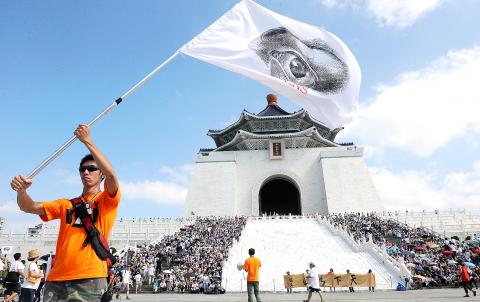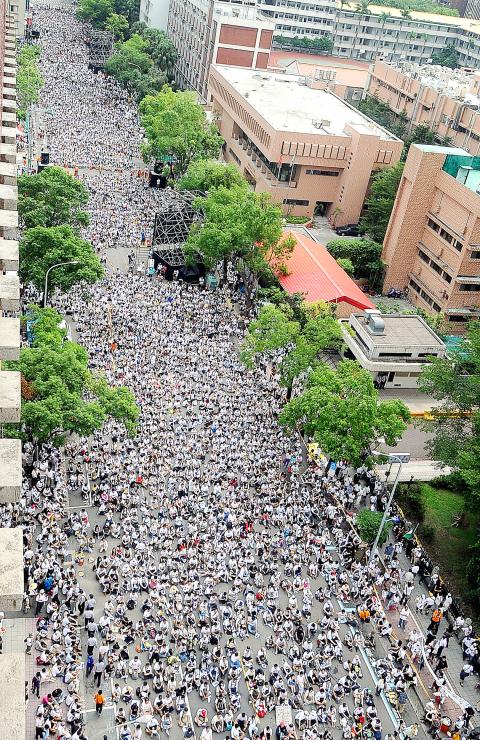With songs, chants, speeches and clashes, tens of thousands of people demonstrated at several locations near the Presidential Office Building on Double Ten National Day yesterday, calling on President Ma Ying-jeou (馬英九) to step down.
While different groups of demonstrators had different appeals — ranging from the fate of the country’s Fourth Nuclear Power Plant in Gongliao (貢寮), New Taipei City (新北市), to the government’s handling of an improper lobbying case allegedly involving major political figures — the call for Ma to step down was the common theme.
“A president who violates the Constitution like Ma should be ashamed of hosting a national day celebration,” said Dennis Wei (魏揚), a National Tsing Hua University graduate student and a member of a student group called “Black Island National Youth Front,” sitting in front of a line of police officers in front of the Presidential Office Building.

Photo: Liu Hsin-de, Taipei Times
He was referring to the Special Investigation Division’s alleged illegal monitoring of lawmakers’ telephones as well as Prosecutor-General Huang Shih-ming’s (黃世銘) report to the president on information gathered through wiretap.
Wei also accused the government of favoring large corporates by signing the cross-strait service trade pact and disregarding the suffering of ordinary people.
“The ruling elite headed by Ma and Premier Jiang Yi-huah (江宜樺) has lost its legitimacy and should therefore step down right away,” he said.

Photo: Fang Pin-chao, Taipei Times
Although the demonstration in front of the Presidential Office was peaceful, student protesters and the police engaged in serious clashes earlier in the morning when the police insisted that protesters remove a truck carrying loudspeakers, leaving several protesters and officers injured.
At a separate setting, a crowd of protesters rallied outside the Legislative Yuan at a demonstration organized by activist group Citizen 1985, calling for revisions of the Referendum Act (公民投票法), the Election and Recall Act for Public Servants (公職人員選舉罷免法), and regulations on election of legislators at-large to lower thresholds for public participation in the nation’s politics.
“When politicians in a democracy no longer listen to the people, we have the right to express our opinions through referendums, but referendums in this country have become a tool for large political parties. The threshold is so high that the only national referendums that ever made it to poll stations were those proposed by the Democratic Progressive Party, the Chinese Nationalist Party [KMT] and former president Chen Shui-bian (陳水扁),” said Huang Kuo-chang (黃國昌), an associate research fellow at Academia Sinica. “Of course the law needs to be amended.”
It is equally difficult for voters to recall elected officials, as the law also prohibits campaigns for a recall, he added.
“Politicians are allowed to launch election campaigns, but the people are prohibited from launching a recall campaign,” Huang said. “Do the politicians all think we the people are so stupid?”
At the rally, a white flag with a “citizen’s eye” on it was raised as a symbolic gesture to signify that people should take back the sovereignty of the citizenry.
Hu Shih-ho (胡世和), uncle of army corporal Hung Chung-chiu (洪仲丘) who allegedly died from abuse while serving in military, also showed up at the rally, panning the government for its slow probe into the death of his nephew despite Ma’s promises.
“Ma’s approval rating is now a little more than 9 percent, that means the people no longer trust him. Shouldn’t we take the power back from him?” Hu asked.
The crowd responded with a loud “yes.”
Later in the afternoon, the crowd moved to Liberty Square, where small forums were held to discuss various public issues.
Citizen 1985 said the rally drew 60,000 people, while police put the peak number at 10,000.
Separately, another group of protesters gathered outside the legislature, urging the government to hear the people’s call to abandon the controversial Fourth Nuclear Power Plant project, which the anti-nuclear activists said is a huge waste of taxpayers’ money and has been plagued by mishaps that could jeopardize public safety.
Additional reporting by CNA

The Ministry of the Interior (MOI) is to tighten rules for candidates running for public office, requiring them to declare that they do not hold a Chinese household registration or passport, and that they possess no other foreign citizenship. The requirement was set out in a draft amendment to the Enforcement Rules of the Public Officials Election and Recall Act (公職人員選舉罷免法 ) released by the ministry on Thursday. Under the proposal, candidates would need to make the declaration when submitting their registration forms, which would be published in the official election bulletin. The move follows the removal of several elected officials who were

The Republic of China (ROC) is celebrating its 114th Double Ten National Day today, featuring military parades and a variety of performances and speeches in front of the Presidential Office in Taipei. The Taiwan Taiko Association opened the celebrations with a 100-drummer performance, including young percussionists. As per tradition, an air force Mirage 2000 fighter jet flew over the Presidential Office as a part of the performance. The Honor Guards of the ROC and its marching band also heralded in a military parade. Students from Taichung's Shin Min High School then followed with a colorful performance using floral imagery to represent Taiwan's alternate name

FOUR DESIGNATED AREAS: Notices were issued for live-fire exercises in waters south and northwest of Penghu, northeast of Keelung and west of Kaohsiung, they said The military is planning three major annual exercises across the army, navy and air force this month, with the navy’s “Hai Chiang” (海強, “Sea Strong”) drills running from today through Thursday, the Ministry of National Defense said yesterday. The Hai Chiang exercise, which is to take place in waters surrounding Taiwan, would feature P-3C Orion maritime patrol aircraft and S-70C anti-submarine helicopters, the ministry said, adding that the drills aim to bolster the nation’s offshore defensive capabilities. China has intensified military and psychological pressure against Taiwan, repeatedly sending warplanes and vessels into areas near the nation’s air defense identification zone and across

A Chinese takeover of Taiwan would severely threaten the national security of the US, Japan, the Philippines and other nations, while global economic losses could reach US$10 trillion, National Security Council Deputy Secretary-General Lin Fei-fan (林飛帆) wrote in an article published yesterday in Foreign Affairs. “The future of Taiwan is not merely a regional concern; it is a test of whether the international order can withstand the pressure of authoritarian expansionism,” Lin wrote in the article titled “Taiwan’s Plan for Peace Through Strength — How Investments in Resilience Can Deter Beijing.” Chinese President Xi Jinping’s (習近平) intent to take Taiwan by force